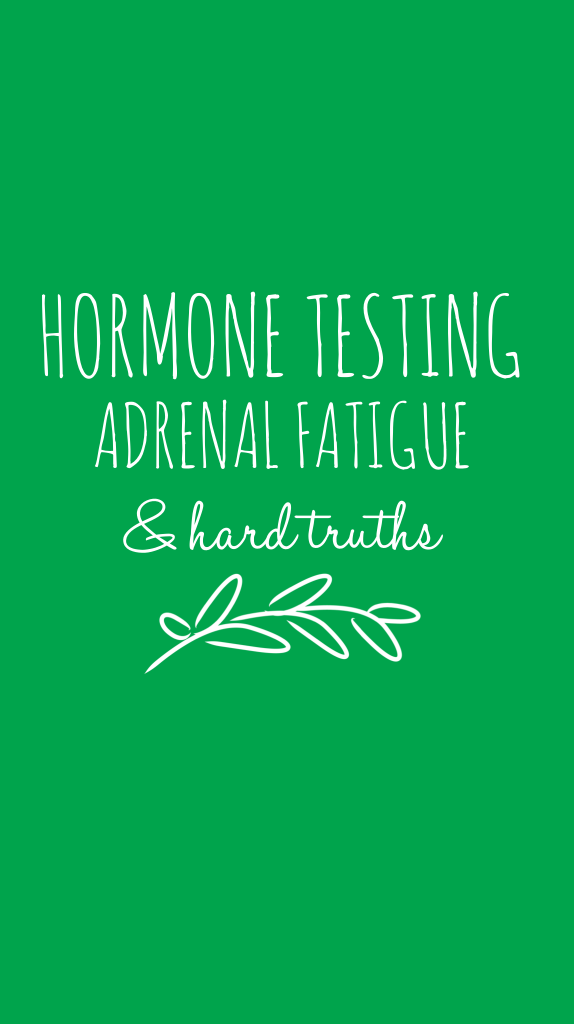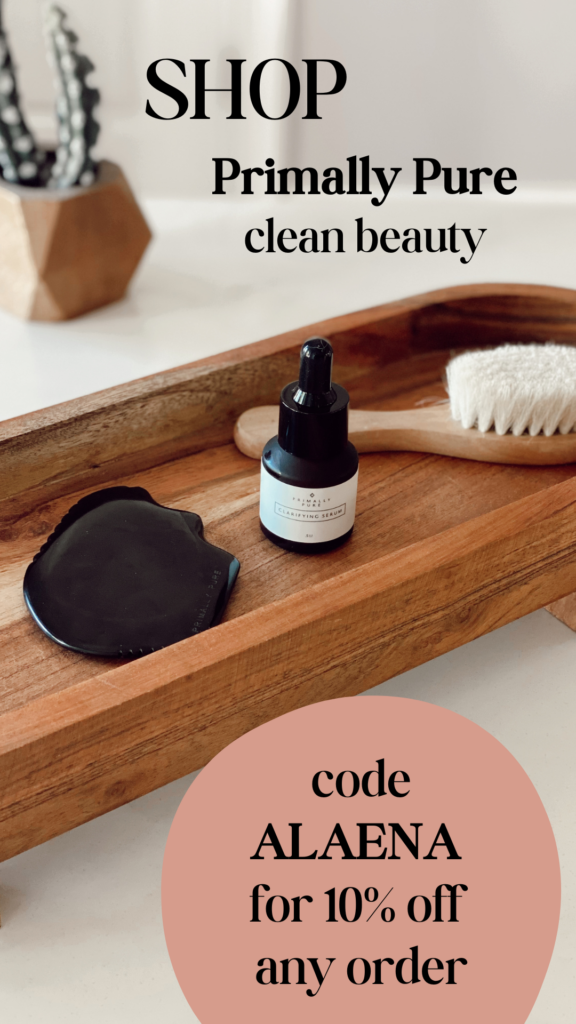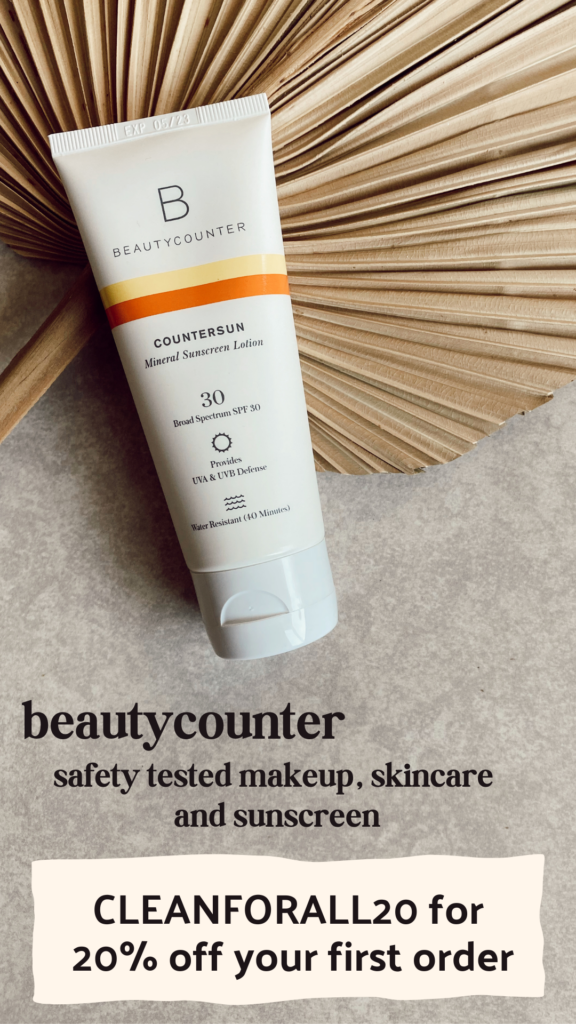DISCLAIMER FOR THIS ARTICLE: This article is not meant to diagnose or suggest diagnostic testing or treatment. I am not a doctor, I am simply sharing my experiences with advanced hormonal testing as requested by many readers. Please do not ask questions below regarding your own health or whether or not this testing would be appropriate for you. You may share your experiences with other women in the comments, if desired. Seek professional help to determine whether or not hormone testing, supplementation and changes in medication are medically appropriate for you.
Today, I will be discussing my recent experience with the DUTCH hormone panel as well as how I am naturally addressing adrenal fatigue caused by motherhood. Motherhood, you are full of loving, hilarious & joyful moments, but can you please return my basic human need of sleep and eating in normal intervals?
DUTCH stands for “dried urine test for comprehensive hormones”. Essentially, your functional medicine practitioner, integrative wellness practitioner, functional NTP or naturopath provides you the test kit (or you order it online) to complete at home during a certain span of your menstrual cycle. The DUTCH test gives a comprehensive look into your sex hormones, 4-point cortisol, total cortisol, state of adrenal fatigue, and how all of these hormones are working together down the hormonal cascade that begins with cholesterol.
For regularly cycling females (cycles not too short or too long), you take your test around day 21 of your cycle. If your cycle is shorter in length, you’ll need to take it sooner; if it’s longer in length, you’ll need to take it later in your cycle. I did the Dutch Complete kit which also included melatonin. There are DUTCH tests that include both blood and urine as well as month-long testing so you can get the most accurate view of how your hormones are cycling for a 28 day period.
**IF YOU’RE SEARCHING FOR A FUNCTIONAL MEDICINE PRACTITIONER, USE YELP TO FIND ONE IN YOUR AREA OR USE THE SEARCH FUNCTION ON IFM.ORG
HOW IT WORKS
You test at 4 to 5 intervals throughout the day by urinating on test strips. You are instructed to essentially dehydrate yourself (my words, not their’s – I hate being thirsty) for many of the test points because the scientists need concentrated urine for the most accurate test results. Test points include immediately upon waking, 2 hours after waking, dinnertime, bedtime and overnight (optional). There are test stipulations like no caffeine before your two morning tests, holding certain medications, and reading the instructions for irregular, short or long cycles.
You send in your dried urine strips to DUTCH who processes, analyzes and sends a report to your practitioner. It took about 3 weeks for me to get my results. Your practitioner should review the results in detail with you and supply an appropriate plan of action. My DUTCH panel cost $250 out of pocket.
SOME (NOT ALL) REASONS YOU MAY WANT TO DO A DUTCH TEST
You are trying to get pregnant but it’s been 12 months with no conception.
You feel tired and wired, cranky, gaining weight, low libido, low motivation (signs of adrenal fatigue).
You have a history of estrogen dominance or are experiencing conditions related to estrogen dominance or painful periods.
You aren’t cycling and are anovulatory (no period, no ovulation).
You want to know how your genetics are playing into your hormone cascade.
You want to see how you are methylating or you have a known MtHfr defect.
You suspect androgen dominance and conditions caused by this such as PCOS – one of the most common causes of infertility.
You suspect you have adrenal fatigue but are not sure which stage you are in which will determine your treatment (this is why I did it).
WHY I DID IT & RESULTS
I took the DUTCH test because I was experiencing low energy in the mornings, poor short term memory, poor recovery from workouts and mood swings. I was 20 months post-partum at time of testing, and my symptoms appeared about 3 months ago during a stressful time period with poor quality sleep.
My results indicated that my body isn’t producing enough cortisol and sex hormones throughout the day to give me the energy I need. Your results page will demonstrate a very detailed graph of your:
CORTISOL (free, metabolized and daily total), DHEA, ESTROGEN, PROGESTERONE & TESTOSTERONE as well as if those numbers are in an optimal range, pre or post menopausal range or too high. You will also find out the metabolic activity of these hormones and how they eventually go through the methylation chain.
Here is a DUTCH RESULTS SAMPLE (not mine!) from their website so you can get an idea of how much information is in your pee. If you’re wondering, blood serum does not produce as accurate testing as the DUTCH. The only hormone I test via blood serum is thyroid. Please note I’ve also done that 4-point salivary cortisol test with Genova but it does not give the same amount or detail of information. The 4-point salivary cortisol test (also ordered through your wellness practitioner) is about $150 and can also give you information on sex hormone levels (but not how they’re interacting with one another).
Other information you’ll get:
-
melatonin
-
neurotransmitters
-
glutathione
-
b12 and b6 markers
-
oxidative stress
ADRENAL FATIGUE
Adrenal fatigue isn’t new to me. I have struggled with it for years on & off even while healing my autoimmune disease and infertility. I have tended towards a hyperactive, Type A, “I hate relaxation” state my entire life (like many people with autoimmune disease!) and that is a breeding ground for adrenal issues. I’m not going to discuss the causes or mechanism of adrenal fatigue here because I’m not a doctor and you can Google that for yourself, but I will provide my experiences.
My first 15 months post-partum my adrenals felt pretty stable. I recovered from my workouts, woke up energized even if my sleep was poor because of teething or multiple wake-ups, but by 18 months things changed quite quickly. I was finishing up my ebook and moving through some typical life stressors (husband working loooong hours, holidays, travel) when I noticed a pretty sudden drop in my energy levels and recovery.
Initially in November, I was having a hard time winding down at night and waking up super early with a ton of energy (around 4 am). I would crash by 10 am, I didn’t have an appetite, and I felt overwhelmed with basic daily activities like cooking dinner or doing housework.
I immediately knew my adrenals had taken a hit from a 2-month span of only sleeping 4 to 5 hours a night while finishing up Enthused (which also coincided with shifts in Grace’s sleep schedule – btw go grab my ebook so it makes this whole adrenal thing worth it). Rather than truck through it and “baby” my adrenals on my own, I decided to do the DUTCH test to see EXACTLY how low my cortisol and hormones were. At this point, I was probably in Stage 2 of adrenal fatigue when your cortisol is usually HIGH – especially in the morning.
We also still breastfeed (she is 22 months old today) which has its own affect on hormones. Breastfeeding suppresses female sex hormones, poor sleep eventually suppresses cortisol (after an initial spike), low cortisol suppresses testosterone and female sex hormones. That’s a recipe for some messy hormones.
By the time I took the test, I was feeling exhausted all day and had gained 5 to 10 pounds despite daily exercise and frankly undereating. I had no problem falling asleep or staying asleep – in fact I needed at least 9 hours of sleep per night. This was only a couple months after I first started feeling signs of adrenal fatigue back in November. This is likely when I entered Stage 3 adrenal fatigue.
WHAT I’M DOING TO RECOVER MY ADRENALS
With my physician’s guidance, I weaned from 3 breastfeeding sessions a day at 21 months post-partum to only 1 a day (in the morning for 5 minutes). I’m going to completely wean after a trip to Napa this weekend. This will be an emotionally difficult process for both Grace & myself, but my intuition is telling me its time for my body to believe it’s only taking care of ONE person instead of TWO!
I also did TONS of other tests for insulin, advanced cholesterol, thyroid, inflammation, etc. They came back GREAT! My cholesterol is in range, my insulin is fantastic, my thyroid meds need to be slightly adjusted (more on that below) and I don’t have any inflammatory markers! My doctor said that thanks to my diet and lifestyle I’m feeling a lot better than I look on paper.
One of my best tips when dealing with a new diagnosis is to focus on everything good going on in your life and in your body. I love my job, I love my baby more than anything in the world, my health otherwise looks excellent, and I’m enjoying taking some time to care for myself right now.
BLOOD SUGAR
It was important for me to know what my blood sugar was doing because it is linked to adrenal health. Thankfully, my insulin and blood sugar is very stable which I can certainly credit my diet. I’m going to continue with my intuitive eating which means eating different types of foods at different parts of my cycle. The biggest issue for me is to eat ENOUGH food. I suspect not eating enough contributed to my adrenal issues because I focused all of my energy on feeding my daughter the most nutrient dense meals. I also tend to not eat full meals when I’m stressed (which I was for several months at the end of 2017). Not eating enough ENERGY (calories) in general can contribute to adrenal issues.
I have been focusing my meals more on higher fat, moderate protein and moderate or low carb (depending on the point in my cycle and time of day). I feel best when my morning meal is at least 500 calories and high in fat and low in carbs. My body also prefers high fat, low carb during my follicular phase (first 14 days of my cycle) and an addition of nutrient dense carbs during my luteal phase. Some people with adrenal fatigue will crave protein & carbs versus protein & fat. Play around with it (without adding stress – your diet should not be a source of stress – if it is then you need to either change your mindset or change your diet), and find what works best for you. The end goal is to stabilize your blood sugar enough that you can go long periods of time in between meals without feeling jittery or hangry (5 to 6 hours for most people – if you find you need to eat every 3 to 4 hours – that is perfectly fine if you’re not getting hangry in between meals!)
THYROID
We did discover I was taking too much T3 medication (Cytomel). I was on the lowest dose only once per day, so we completely took me off T3 and now I’m just on T4 (Tirosint). Too much T3 can also stimulate the HPA axis and contribute to adrenal issues. We will be testing my thyroid again in 5 to 6 weeks to see how my body is doing converting T4 to T3 on its own without supplemental T3, and then we will decide if I need to be on a smaller compounded amount of T3. I do not take natural desiccated thyroid as I have an EXTREME autoimmune reaction to it – worse than any other food – WAY worse than if I have a gluten or soy or nightshade exposure. This is irrelevant to the adrenal fatigue conversation, but I want to raise awareness that natural desiccated isn’t always the best choice, even though in natural medicine we’re told it is.
EXERCISE
Unfortunately, I had JUST joined a gym right before I found out I was in stage 3 adrenal fatigue. I was feeling pretty wiped out from my gym workouts and had poor recovery like muscle soreness for 3 to 4 days post-workout. Those are also definite signs of adrenal fatigue, and your body’s cue it’s time to take it way back on exercise. I stopped going to the gym, and I have resumed jogging 5x a week at a slow, manageable pace (never out of breath) for 2 to 3 miles as well as daily walks with my daughter and dog. I use the step tracker on my iPhone and average 10,000 to 15,000 steps a day.
I feel energized by this movement rather than drained like I was feeling from weights and circuits (even though I wasn’t pushing myself at the gym). I’ve heard weights are best for adrenal fatigue versus cardio, but I have found steady state cardio like jogging and walking to be enjoyable but not overtaxing.
STRESS REDUCTION
ONE: Stress reduction is by far the most important factor in healing adrenal fatigue in my situation. I have added once weekly acupuncture at a private practice that focuses on prenatal and post-partum health. We work on adrenals, sinuses, SI join and sciatica pain, relaxation, sleep, and TMJ all within a 1 1/2 hour appointment! I have not added Chinese herbs to my regimen yet, as I am very cautious with herbs and supplements as someone with an autoimmune disease and easily reactive immune system.
TWO: I also have subscribed to this motto created by the great Casey Wilson of The Bitch Sesh Podcast: Not Gonna Take That On. I’m making an effort to not take on other people’s stress (as an empath, this can be difficult) and to stop worrying about the future (something I’ve struggled with since becoming a mother).
THREE: I participate in at least one stress-reducing activity a day whether that is going for a long solo walk after dinner, meditating for 20 minutes using the Headspace app, laying out by the pool with a book, or watching a Real Housewives marathon (which now equates to half an episode since embarking on motherhood).
SUPPLEMENTS
I’ve had many questions about which supplements and adaptogens I’m using since I began talking about the DUTCH test on Instagram. I don’t run to supplements in cases of illness or adrenal fatigue. In my opinion, the root of a lot of modern day health issues is stress. Supplements and adaptogens are bandaids for the true problem of an overburdened stress response system. They certainly help in some cases, but I have found many of them make zero difference (for me, you may have a completely different experience) or the effect is placebo (which wears off after a week for me). And I can’t stand paying hundreds of dollars a month for a counter full of supplements. I also think supplements and medications can reinforce the victim/sick mentality. The more medication bottles you see on your counter, the more you feel like you’re broken or need external sources of aid. Please don’t take this as an affront or criticism to your supplement routine – this is my opinion based on my personal experiences with multiple functional medicine practitioners over-prescribing supplements.
Side note for those of you with autoimmune disease: a common adaptogen called ashwagandha is actually a nighthshade which can stimulate the immune system and worsen autoimmune symptoms. There are non-nightshade adaptogens like rhodiola and holy basil (which can be immune stimulating, so you may want to avoid). I do not feel comfortable taking adaptogens while breastfeeding so I am currently avoiding. You also do not want to throw adaptogens at every adrenal fatigue patient. Adaptogen use is going to depend on the patient’s stage of adrenal fatigue.
Rather than taking all the supplements my doctor suggested, I purchased a few from Amazon (excellent return policy!) and used them for a few weeks. I used my intuition to determine if I sensed a difference from the supplements. Generally, I did not so I returned them. The supplements I returned were Turmeric/Curcumin, phosphatidylserine, DHEA and Pregnenolone.
The supplements that I am taking are Vitamin C, Zinc, Magnesium + B6 (at night for sleep & relaxation), high-quality Vitamin D + Omega3s, Trace Minerals and Real Salt (added to all my food and to my water if craving). I’m not sharing my dosage because that is something your doctor needs to determine for you.
Vitamin D and Zinc are important for immune system health (and people with autoimmune disease tend to be deficient in both), Trace Minerals & Real Salt help replenish minerals your adrenals need to properly regulate hormones, sodium/potassuim balance and therefore blood pressure, muscle strength, thirst, energy and heart rhythm. Magneisum + B6 is useful for nighttime relaxation – my body winds down at night and sleeps more soundly with nightly mag.
Instead of over-supplementing, I’m focusing on the above lifestyle and stress reduction practices: eating an energy and nutrient dense diet (and not skipping meals), omitting strenuous exercise, practicing joy and including more joyful activities in my life, age old stress reduction practices like acupuncture and meditation, and intuitive supplementation.
Within 3 weeks of doing my own protocol, I feel 50% better. My energy is mostly stable during the day (some dips during mid-morning still), my mood is more stable (less feelings of anxiousness and worry), and I’m not feeling overwhelmed by daily activities and responsibilities.
ANSWERING YOUR QUESTIONS
1. How long does it take to heal from adrenal fatigue?
There is no timeline for healing the body. That may not be the answer you want to hear, but a shift in mindset is also warranted here. How long have you been stressed? Type A? A worrier? An over-exerciser? An under-eater? A self-loather? All of these tendencies lead to an overburdened central nervous system and adrenal response. The sooner you release expectations around healing, the more success you will see and the more joy will flow into your life.
I get this question all the time about the Autoimmune Protocol. “How long do I need to be on it? How long does it take to heal?” No one has this answer for you. It took me 6 months to be successful with reintroductions while it took some people 1 month, 1 year or 2 years. AIP is not a prescription – take 3x a day and see symptoms relief in 3 months. We cannot command our bodies to perform how we would like them to. In fact, that notion is often what gets us in the mess of hormonal imbalance and chronic illness.
Give yourself grace, compassion and learn PATIENCE. Pretend you’re a Buddhist Monk, simplify your life, practice gratitude every day, and stop listening to health podcasts or reading health blogs (even this one!) if it causes you stress. It’s okay to be curious and to be thirsty for knowledge, but often times this pushes women into a state of chronic worry, fear and comparison.
LET GO. Every time your inner voice starts to question, worry or criticize, say LET GO. Take a deep breath. Shake out the negativity and fill your mind and body with a joyful memory or hobby.
2. How does adrenal fatigue affect sleep?
Initially, in Stage 1 or 2 you may experience the common “tired but wired” feeling. You get a second wind around 8 pm even though you felt a little sleepy at 6 pm. You could stay up until 11 pm or 1 am watching TV, reading, or scrolling social media without feeling the need to shut your eyes and get rest. You may feel energy dips earlier in the afternoon around 3 pm as well.
By Stage 3 to 4 adrenal fatigue, you may feel tired all day. You may not have trouble falling asleep at night (or this ability is inconsistent), but your sleep is restless and you don’t feel well-rested in the morning. You may feel the need to be in bed by 9 pm (because you’ve been tired since 10 am) and only have enough energy to drag yourself out of bed at 9 am the next day.
You can support your sleep cycles and help heal adrenal fatigue by practicing good sleep hygiene. For me, that means shutting down my phone and computer at 8 pm, taking a 20 minute epsom salt bath, dry brushing, taking my Magnesium + Trace Minerals supplements and reading in bed for as long as it takes for my eyes to feel heavy. I also wear these very sexy amber night-vision goggles as soon as it gets dark out. This has significantly helped with eye strain, headaches and increasing melatonin. Cortisol and melatonin are essentially opposites. We want our cortisol to be low at night and our melatonin to be high. We want our cortisol to spike in the morning (but not too high) and our meltatonin to be low so we have enough energy to take on our day.
I have read in several books that the adrenals heal the most during 10 pm to 2 am so it is important to establish an early bedtime routine while healing adrenal fatigue and ensure rested sleep during those hours.
3. What is the difference between adrenal fatigue and feeling fatigued from thyroid disease?
Unmanaged thyroid conditions can also contribute to adrenal fatigue since the adrenals and thyroid work closely together. Hashimoto’s thyroiditis and hypothyroidism causes a depression of the metabolism which can be felt as decreased energy and muscle fatigue. You may have trouble climbing stairs or lifting weights. Adrenal fatigue can also cause feelings of fatigue with muscle weakness, lightheadedness and poor exercise tolerance. The best way to tell the difference between which gland is causing the fatigue is to have a full thyroid panel done as well as a DUTCH or 4-point salivary cortisol test. Hashimoto’s also causes the outer 1/3 of the eyebrows to fall out, general weight gain (rather than many people with adrenal fatigue who gain weight in their middle), constipation (adrenal fatigue can cause diarrhea), and slowed thinking. With adrenal fatigue, you may see orthostatic hypotension (feeling dizzy when changing positions – i.e. from laying down to sitting up), obsessive tendencies, hyper responsiveness to stimuli (i.e. loud sounds, sudden movements causing you to startle easily) and brain fog (which is different from slowed thinking).
4. Can I drink caffeine when I have adrenal fatigue?
You can do anything you want to do, but if you want to heal your adrenals and balance your hormones, nix the caffeine. Caffeine is an adrenal stimulant. Your adrenals have been overstimulated if you are suffering from adrenal fatigue, so adding caffeine to your daily routine is like throwing salt on an open wound. Omit all caffeinated beverages including coffee, matcha, black/green tea, excessive amounts of dark chocolate, soda or energy drinks. You may have a couple rough days of feeling more exhausted than usual but this is a detox your body needs. Soon you will find yourself with MORE energy than you did when you were drinking caffeine and further depleting your adrenals.
If you can’t quit your Bulletproof coffee or morning cup of crack, I add coconut milk to Traditional Medicinals Roasted Dandelion Tea. You get a healthy dose of fats and a jumpstart on liver detoxification in the morning – excellent if you’re also dealing with an overburdened liver or high estrogen or testosterone.
5. Should I quit sugar?
This is going to be dependent on your level of inflammation, blood sugar regulation and whether or not you’re addicted to sugar. It’s one thing to go for a square of dark chocolate after lunch, it’s another thing to eat a pint of dark chocolate ice cream several nights a week because it’s your drug of choice. Okay, those are two extremes, but most of us will be able to tell if we are addicted to sugar and if it’s negatively impacting gut and brain health. If you can’t tell, here are some signs: energy crashes 2 hours later, headaches, lower belly bloating, constant sugar cravings even after satisfying meals, fruit not being sweet enough for your palate, and mood swings. Sugar is addictive and anyone who tells you it’s not has not done their research on the physiological result of sugar consumption. No need to be afraid of it – just know your limits, and recognize if your habits are making you feel worse rather than healthier.
6. Talk about adrenal fatigue and post-partum. Is it preventable?
It’s hard for me to talk about adrenal fatigue prevention post-partum when I did the best I could and still became overtaxed. I began my motherhood journey with the best intentions of avoiding adrenal fatigue – prioritizing sleep, eating well, minimizing stress, not taking on big projects, and getting rid of any toxic people (who wants that around their kid?) Low and behold even with my strict 10 pm bedtime and Paleo, low sugar style of eating, life stress can’t be predicted.
Rather than trying to prevent adrenal fatigue (and then allowing THAT to stress you out), aim to recognize the signs of the early stages such as weight gain, feeling wired, early waking, inability to fall asleep, and mid-day fatigue. By recognizing the rabbit hole you’re about to jump down, you can re-assess your lifestyle and take a step back.
MY HARD TRUTHS
Don’t keep pushing harder in the gym if you see weight gain, don’t try 14 new diets to try to lose the weight or add another element of obsessive control to your life, and don’t panic if you’re diagnosed with adrenal fatigue. Adrenal fatigue is not cancer. I say that as someone who has watched several people pass away from cancer. It’s a modern day illness caused by taking on too much and not allowing your body the rest and love it needs. You will get better – you just have to prioritize stress management as well as re-prioritize what you’re spending your energy on.
Hate your job? That’s a huge source of internal and external stress. Find a new job. This world is full of meaningful opportunities – don’t continue to do something you hate just to pay the bills. Set up a financial plan where you have several months of expenses in savings & work towards something you love. Take the leap – if you continue to let fear stand in your way of achieving your life purpose, you will remain at status quo. One of the most painful emotions as a human is regret.
Hate your body? Aren’t you tired of hating your body? When is it going to stop? You’re the only one that can fix the relationship you have with your body. Do you hang around friends with eating disorders or those who constantly criticize themselves therefore making you feel judged and inadequate? Do you follow bloggers on Instagram who are self-obsessed, constantly showing off their 6-pack and hard workouts, and who seem to only care about how they look? Get rid of those relationships. Work on finding gratitude in your body but also coming to the very common sense realization that spending time worrying about your body is time wasted. You could be enjoying life and making memories during all of those times you’re at the gym or picking yourself apart in the mirror. The self love journey will look different for everyone, and I’m no expert, but I do know you can CHOOSE to help yourself.
Health worrier? Do you constantly worry about your health? Every time a blogger posts about a new diet, supplement or diagnosis, do you think “I must have that!”? If that’s you, delete every single health podcast from your phone, only use the internet for work and social connection, and work to dig yourself out of the victim mentality. The #1 biggest problem I see in the autoimmune/health community is this constant fear, worry and obsession with health. I used to be this way which is how I can recognize it in others. If I had received an adrenal fatigue diagnosis 5 years ago, I would have spent WEEKS researching it, obsessing, trying to find the solution that would cure it the fastest. That is so exhausting for yourself, annoying for others, and hindering. to your body’s healing.
Turn inward and ask yourself, “What about my life is causing me emotional and/or physical stress?” Write down the 5 things about your life that bring you the most amount of stress (be honest: are your workouts actually a source of stress yet you call them stress relief?) Write down 10 things about your life that bring you joy. Focus on those 10 things, let go of those 5 things.
My Top Ten
-
Spending as much time as possible with my daughter.
-
Date nights with my husband.
-
Vacations and weekend trips
-
My nightly solo walks with my dog.
-
Bravo (for sure, top 5)
-
Ghee (if there’s one food that makes me happy, it’s ghee)
-
Wine dates with girlfriends
-
Responsible online shopping
-
Dancing
-
Phone calls with faraway friends










19 Responses
Wow, what a thoughtful and well written article! Sounds like exactly what I went through when my second was 18 months…with an abundance of stressors! I still havent recovered, but I was diagnosed with Hashi’s at 12 and I only just found this online community of autoimmune wellness/aip advocates a few months ago (im now 36). All the years of feeling like junk, even though my thyroid dosage looked to be fine (never a full thyroid panel tested though!). I cant tell you what a relief it was to stumble upon all this info…im not crazy/weak minded/spirited…im just truly quite ill (despite what the dr.s have been saying!). We moved last year so i no longer have a dr. but at the end of the day, it seems like aip and intuition around that are what is going to help me recover more than anything else. I am starting aip in april, and will be considering all of this regarding adrenal fatigue as well. Thank you for taking the time to so thoroughly share your experience!
Hi Joleah! Thank you so much for sharing your story- I’m so sorry it took that long for you to find some answers but the positive side is with AIP many people see changes rather quickly! You have an encouraging & uplifting attitude and you will do GREAT!
I love this Alaena! The part about being a Health Worrier (not warrior) really resonated with me. I tend to obsessively research/put into action alllll the things. Took the action step of deleting far too many health podcasts at your recommendation. Thanks for sharing your journey!
Hi Nicki – Been there, girlfriend! Try to find some podcasts that bring laugh and joy or new information on topics other than health! Hope you’re feeling better this week!
This was perfect. Thank you for writing so honestly. I found this post incredibly helpful and at moments eye-openings.
Do you happen to know if the results will be way off if I tested one day outside of the window? (thanks irregular cycle!) I called the company as I’d already mailed in my samples and they just said my Dr would have to decide and he’d have to cancel the current sample if he wanted me to retest. But my Dr hasn’t replied, and now I’ve been charged 🙁 I can’t seem to find any info on if my results will even be accurate or not. Any thoughts? Thanks!
You followed the instructions for irregular cycle? I don’t think it will be WAY off if it’s just one day! If you wrote it on your test req form, they should allow you to submit another sample if your doctor calls them.
yeah… unfortunately their recommendation is only helpful if it’s consistently irregular as in always a longer or shorter cycle. Not so helpful if your cycle could be long or short on any given month. I was thinking the same, that it can’t be WAY off with just one day though. But as I don’t know much about hormones I wasn’t really sure… I’ll just hope my Dr gets back to me soon!
Girl, I am in the same breastfeeding dilemma boat. My body is begging me to quit and refuel my stores. My adrenals are stable now, but a few nights of extra wakings or when my 19 month old nurses more than usual for a few days and then my adrenals dip and my sleep and energy suffers. Ugh, I just don’t know how to wean him- he loves it so much and I do as well (most of the time) ?. Maybe I’ll just cut him back to once a day.. how will I get through the tantrums though?? Lol
It was easier than I thought. We fully weaned at 22 1/2 months (almost 6 weeks ago), and I still actually have a milk supply lol I haven’t noticed a huge difference in adrenals yet, but some smaller changes like better energy throughout the day. It was heartbreaking to have our last breastfeeding session, but we took photos, and I cried a TON for weeks, but we’re still just as close as ever, even more so.
So I finally read this article. I was waiting the results of my DUTCH test when this article first came out. I wanted to wait until I had my results and heard from my MD. Then, unfortunately, I kind of forgot about it. I was found to have adrenal fatigue, too much estrogen, and too much testosterone, which I was told, the excess testosterone converts to even more estrogen. I had been in prempro for nearly 6 years, which I’m finally off! I’m 59, 60 in 5 months. Now, just this week, I’ve also received the diagnosis of hereditary hemochromatosis. Really feeling pretty bummed, I never thought I’d have such health challenges. (Arrogant of me, I know). I’ve done the dietary changes for my health, I’m seeing a great FMD, and have been making changes. Oh, I also have Hashimoto’s. I was told the only exercise I should do right now is restorative yoga and walking-no jogging or running. I used to work out a total of about 2 1/2 hours per day, 5-7 days per week and I used to do marathons. My big hold out now has been coffee. I know I need to let it go, but I so enjoy it. Yikes. Lord help me. My MD said it could take me up to a year to recover from the adrenal fatigue, which, most likely is factoring in my age and other health challenges. My job is incredibly stressful and I really don’t know how to change that without significant financial challenges. Guess I’m just venting to someone who understands.
Hi Jean Marie! I am going to send you an email with some words of encouragement <3
Hi Alaina,
Question. I’m curious to take the DUTCH test but I’ve not had a cycle at all for months. I’m only 49 so I’m thinking it’s hormone imbalances rather than menopause that’s causing the absence of a cycle. Anyway, are there special instructions on when to take the DUTCH test when a cycle is completely absent?
Thank you for any insight on this matter.
Yes they do have instructions for different types of cycles but your doctor will also have an idea of when to have you test!
I was just diagnosed with Hashimoto’s and am taking the Dutch test as we speak (well, no, that would be gross but you know what I mean). I found your article so helpful and needed some down to earth talk like this. So thanks. I am still processing my diagnosis and having a hard time eating how I should. AIP is the exact opposite of how I usually eat (I’d call my diet ‘rustic’). I want to make the changes and heal but damn.. it takes a lot of energy and a lifestyle I don’t yet know.
Thank you for this down to earth article. I just got back from my Naturopaths and she recommended taking the DUTCH test. I’ve been battling debilitating anxiety, multiply miscarriages along with a bunch of other annoying health issues the past year and a half. Your article is very helpful and gives me some hope that this test might give me piece of mind to whats going on with my body and mind.
Hi Chrissy – I’m so sorry you’ve been through such a difficult time. I hope the DUTCH test helps give you some answers and leads you down the right path. I would take the test again in a heartbeat (I’m actually post-partum with my second child now and was able to conceive after balancing my hormones).
Will a regular Dr. Prescribe it or only an np? I’m still nursing my 17 month old and I love it. Have had adrenal failure in past when I did saliva test. Do you think I can get just as good info with full blood panel work since this is So costly?
Likely not a conventional doctor (they’ve probably never even heard of this test and will only do standard blood testing which many believe do not accurately measure the useable form of hormones in the body like urine or saliva testing does).